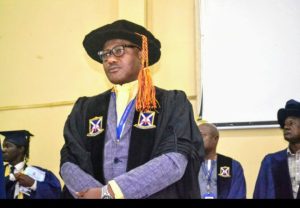

By Barth Ikiebe.

The Deputy Vice-Chancellor of Ajayi Crowther University, Professor Muyiwa Popoola, has called on Nigerian journalists to uphold professional ethics and avoid reports that could incite conflict, particularly as the country approaches the 2027 general election.
Popoola made this call in Yenagoa while presenting a paper at the maiden summit of the Bayelsa State Council of the Nigeria Union of Journalists (NUJ), held recently.
In a statement issued on Monday, Popoola emphasised the need for professionalism and adherence to ethical standards to protect Nigeria’s fragile democracy.
The professor of Communication and Media Studies explained the distinction between morality and ethics, noting that while morality relates to socially accepted behaviour, ethics provides the framework for making decisions about what is right or wrong.
He stressed that political reporting is often highly sensitive and must be handled carefully to prevent the escalation of tensions or the perception of bias.
“A truly effective Fourth Estate of the Realm comprises socially responsible, development-oriented journalists who practise conflict-sensitive reporting and responsibly address political conflict and hate speech,” Popoola said.
He urged journalists to embrace their roles as gatekeepers and agenda setters by promoting democratic values and stability through balanced and sensitive reporting.
“With political manoeuvring already underway ahead of the 2027 elections, media professionals must play a key role in nurturing and stabilising Nigeria’s democracy. This will help avert any undue and detrimental interference in the nation’s political affairs,” he added.
Popoola also stressed the importance of core journalistic values, including accountability, honesty, integrity, fairness, and respect, in building public trust.
While advocating for press freedom, he warned that restrictions on the media could hinder democratic progress.
“Press freedom is inherently tied to societal freedom. When journalists are denied this right, especially in reporting the political process, the electorate is deprived of access to vital information. In such circumstances, democracy cannot flourish or be sustained,” he said.
Popoola also identified key drivers of unethical journalism, such as fabrication, misrepresentation, defamation, sensationalism, and content manipulation, many of which stem from political conflict and hate speech.
He cautioned that these practices damage individual reputations and undermine public confidence in the media, especially when reporters allow personal, religious, ethnic, or political biases to influence their work.
Edited by Dada Ahmed.

